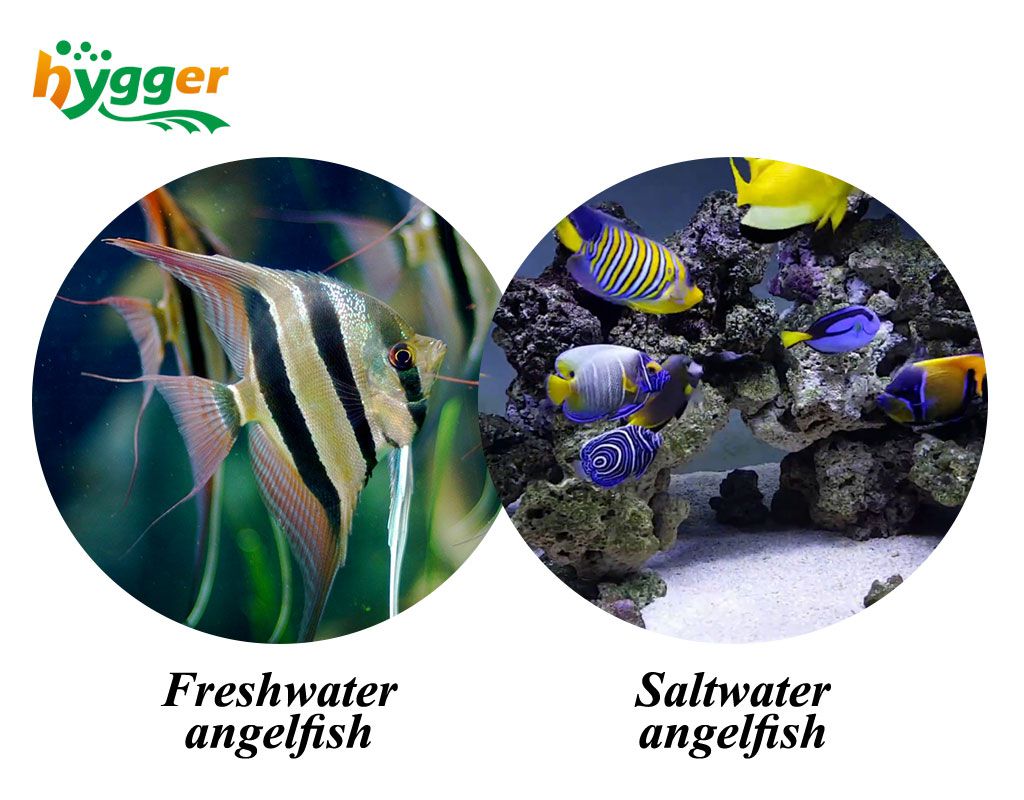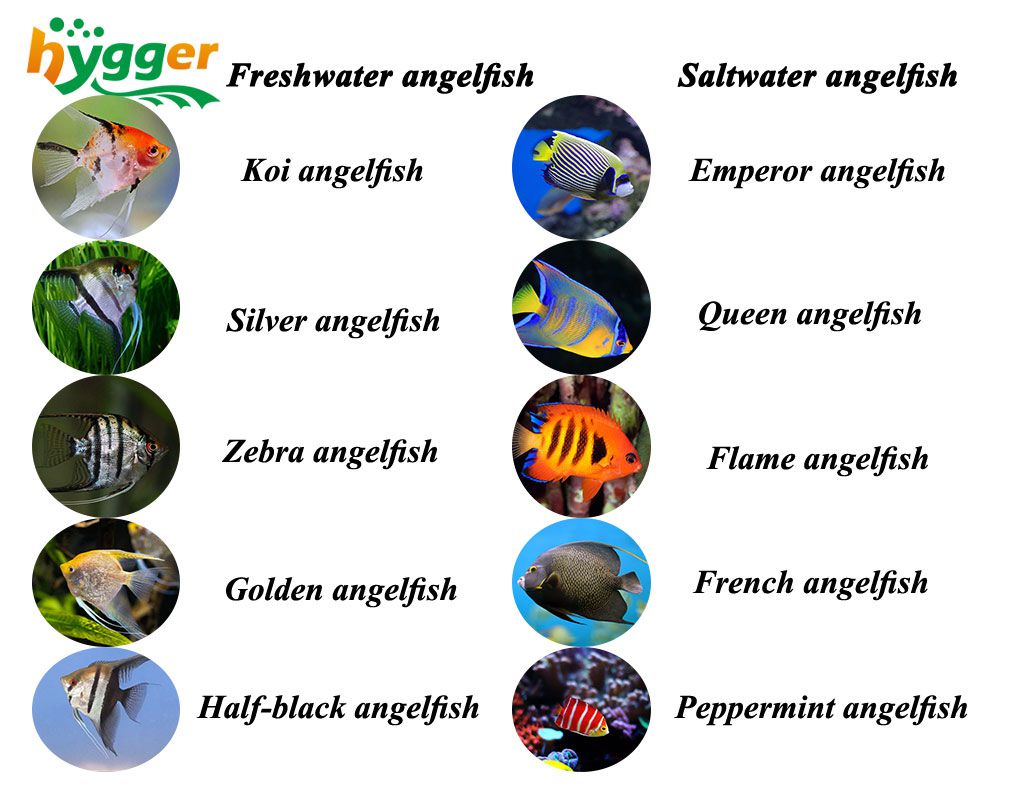Fish Profile – Angelfish Facts and Tips
Angelfish consist of freshwater and saltwater species. Most freshwater angelfish are peaceful, but they will also become aggressive in the case of pairing and spawning. On the contrary, most saltwater angelfish are aggressive and territorial. If you’re interested in Angelfish, read on to find out more you want to know about them, for example, about the Angelfish tank mates, etc.
Are angelfish freshwater or saltwater
Basic info about angelfish
| Freshwater angelfish | Saltwater angelfish | |
| Family | Cichlidae | Pomacanthidae |
| Average lifespan | About 10–12 years | About 10–15 years |
| Adult size | 4–6 inches | 8–12 inches |
| Diet | Omnivorous | Omnivorous |
| Temperament | Peaceful | Peaceful /Aggressive |
| Minimum tank size | 20 gallons | Small angelfish: 20 gallons Medium-sized angelfish: 55 gallons Large-sized angelfish: 100 gallons |
Pterophyllum – freshwater angelfish
Freshwater fish are from tropical areas, belonging to the Cichlidae family. They possess round bodies and elongated dorsal and anal fins. Generally, freshwater angelfish come in three species – Pterophyllum altum, Pterophyllum leopoldi, and Pterophyllum scalare.
Next, we will list some common freshwater angelfish:
- Koi angelfish
- Silver angelfish
- Zebra angelfish
- Golden angelfish
- Half-black angelfish
Pomacanthidae – saltwater angelfish
Saltwater angelfish can be found in warm water areas. Featuring compressed bodies and rough scales, saltwater angelfish have bendable fins. Also, most saltwater angelfish are vibrant. They have brilliant body colors and special patterns, like spots and stripes. However, some angelfish will change their colors as they grow up. For example, emperor angelfish. Besides that, saltwater angelfish prefer tanks with caves, corals, and rocks, which provide places to hide. And they fancy staying at the bottom of the tank. Furthermore, the available diet for saltwater angelfish includes algae, zooplankton, live brine shrimp, mysid shrimp, flakes, and others.
The followings are some popular saltwater angelfish for reef tanks:
- Emperor angelfish
- Queen angelfish
- Flame angelfish
- French angelfish
- Peppermint angelfish
How long do angelfish live
In general, freshwater angelfish can live up to 10–12 years, while the saltwater angelfish reach about 10–15 years. Then, what is the optimal living environment that angelfish can live happily and keep healthy? The table below will give you a reference.
| Freshwater angelfish | Saltwater angelfish | |
| Ideal water temperature | 78-84℉ | 78-84℉ |
| pH level | Less than 6.5 | 8.1-8.4 |
| Water hardness | 3-8 dKH | 8-12 dKH |
| Ammonia level | 0 ppm | 0 ppm |
| Nitrite level | 0 ppm | 0 ppm |
| Nitrate level | Less than 20 ppm | Less than 20 ppm |
| Specific gravity | – | 1.020-1.025 |
| Calcium level | – | 380-450 ppm |
| Magnesium level | – | 1250-1350 ppm |
Besides that, let’s take emperor angelfish as an example. It is best to keep the emperor angelfish in a minimum tank size of 200 gallons. Because they are large and territorial. A large tank size provides sufficient room for emperor angelfish to swim and explore around the tank. Also, it is feasible to add aquarium decorations to provide hiding places, like rocks and caves. Furthermore, it is feasible to add corals. For instance, star polyps, bubble corals, and hammer corals. In addition, adding an aquarium filter is necessary. It is beneficial to reduce fish feces, waste, and other unnecessary substances.
How big do angelfish get
Commonly, freshwater angelfish can grow up to 4–6 inches, while saltwater angelfish can reach 8–12 inches. Next, we will share some pointers on how to make angelfish grow faster.
- Keep angelfish in an aquarium of at least 55 gallons. Small tanks may pose a risk of overcrowded and limit the growth rate.
- Keep the water temperature between 78℉ and 84℉. Consequently, it is best to add an aquarium heater to maintain stable and optimal water temp.
- Reduce stress by adding aquarium decorations or aquatic plants to provide hiding places.
- Monitor the aquarium water. The aquarium test strips can help you a lot and can monitor 7 crucial water parameters, including general hardness, total alkalinity, carbonate root, nitrite, nitrate, free chlorine, and pH.
- Feed angelfish with live food to make sure of sufficient nutrients. For example, worms and brine shrimp. But never overfeed. Because decaying uneaten food would cause bad water quality, which may bring bad effects on fish health.
- Change the aquarium water and do tank cleaning regularly. It is recommended to change 30-50 percent of the water each week. During water changes, you can clean the tank, like the aquarium substrate. It would be helpful to remove ammonia, nitrate, and nitrate, while also making sense in maintaining great water quality.

How do freshwater angelfish vary in hardiness?
Freshwater angelfish are hardy, and they can tolerate a wide range of water temperatures. The ideal water temperature should be in the range of 78℉ and 84℉. But the lowest water temperature of different angelfish can be a litter bit different. For instance, koi angelfish, silver angelfish, and zebra angelfish can survive at a temperature of 75℉. While golden angelfish and half-black angelfish should be kept in the lowest water temp of 78℉.
What fish can go with angelfish?
Keeping incompatible fish in an aquarium can be a disaster. In this part, we will go walk you through some feasible angelfish tank mates of freshwater and saltwater.
| Tank mates | |
| Freshwater angelfish | gourami, rainbow fish, peaceful barbs, corydoras catfish, ram cichlids, molly fish, rosy tetras, cardinal tetras, rummy nose tetras, black skirt tetras, zebra danios, harlequin rasbora |
| Saltwater angelfish | Tangs, Clownfish, Butterflyfish, Anthias, Blennies, Gobies, Triggerfish, Damsels, Eels |
FAQ
Can angelfish live with goldfish?
No, you should not keep angelfish with goldfish. Angelfish are warm-water fish, while goldfish are cold-water fish. The former prefer living in a temp range of 74-84℉, but the latter fancy a water temperature of 68-74℉.
Can Betta fish get along with angelfish?
No, it is better to avoid keeping betta fish with angelfish. Because betta fish feature long and flowing fins, while they move slowly. It poses risks of fish fights between betta fish and angelfish.
Why are angel fish attacking other fish?
Freshwater angelfish are peaceful, but they will become aggressive during the spawning season. Also, some saltwater angelfish are peaceful, while others may be territorial. Besides, angelfish may attack smaller fish. Moreover, you should make sure of adequate room. Limited space is one reason for fish fights.

